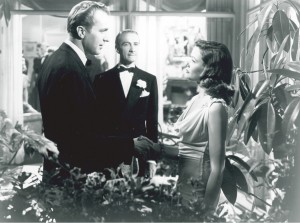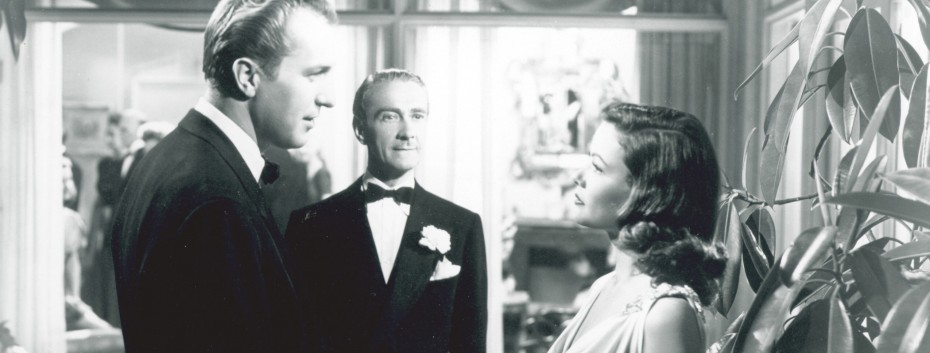Everyone wants to know about ‘Laura’

It doesn’t take much to fall in love with Otto Preminger’s Laura, a 1944 noir masterpiece that features one of the best supporting performances of all time. Clifton Webb offers a sly, sardonic turn as Waldo Lydecker, a snobbish critic who enjoys typing out his columns while bathing in the tub. He’s a bon vivant who has no problem peering down from his lofty perch and tsk-tsking the minions who dare to get in his way.
Webb, with his hair perfectly slicked back and his eyes searching for someone to insult, is the best component of the classic black-and-white film. The plot, based on a novel by Vera Caspary, is needlessly complicated and subject to melodramatic twists. But Webb’s expert portrayal of a man unable to stay out of a suspicious police investigation is memorable.
Detective Lt. Mark McPherson (Dana Andrews, doing his best gumshoe) is all business and no play. He chews on every last bit of detail, never taking off the guise of an investigator. He smokes like a chimney and wears his hat cocked at just the right angle. His droll, almost mechanical delivery should convince any potential subject that he’s incapable of turning off the serious switch.
The detective’s current case involves the murder of Laura Hunt (Gene Tierney), a lovely lady who became a close confidante of Lydecker. Her heart belonged to Shelby Carpenter (Vincent Price), a mysterious young man who has a strange relationship with Laura’s aunt, Ann Treadwell (Judith Anderson).
This group dynamic is put to the test by McPherson, who never shows emotion, but somehow is able to fall for the memory of Laura. Her tragic death at the hands of a shotgun has affected many lives, and it’s up to the detective to sift through the exposition and discover the truth about her demise.
Preminger is a noir specialist, and he’s able to make the shadows and light work to his favor. The apartments, restaurants and rainy landscapes all look like postcards come to life. The setting proves to be as important as each individual character.
The screenplay by Jay Dratler, Samuel Hoffenstein and Elizabeth Reinhardt is typical; it’s filled with many scenes where the characters stop what they’re doing and recount what just happened and what they’re thinking. Given the time period this was filmed and the atmosphere of film noirs, it doesn’t take much to forgive Laura’s faults.
What makes the movie still an enjoyable cinematic experience, some 67 years after its original release, is Webb’s fine performance. This is an unusual actor playing an unusually entrancing part.
All of the other characters you’ve seen before: the skeptical copper, the damsel in distress, the suspicious lover, the jealous aunt. Waldo Lydecker is an original. He seems to be genuinely in love with Laura, but he’s also a vile creature who knows how to throw verbal daggers that pierce right to the heart.
We never come to know why Waldo loves Laura so much. Their relationship never seems sexual or Platonic. There seems to be a social element to their coupling, as if they receive a few extra strata boosts from each other’s company. With few details about the relationship, the audience is left to believe something deeper, maybe darker is brimming under the surface. We come to realize that we’re watching people beholden to their obsessions, almost like an unspoken caste system where the haves separate themselves from the have-nots.
Webb, who was nominated for an Oscar for this role, only has to offer a simply devilish glance, and it instigates a flurry of pondering. What could this man be capable of? Why does he make us so uneasy?
By John Soltes / Publisher / John@HollywoodSoapbox.com
-
Laura
-
1944
-
Directed by Otto Preminger
-
Written by Jay Dratler, Samuel Hoffenstein and Elizabeth Reinhardt; based on the novel by Vera Caspary
-
Starring Gene Tierney, Dana Andrews, Clifton Webb, Vincent Price and Judith Anderson
-
Running time: 88 minutes
-
Playing at the Film Forum in New York City from Dec. 30 to Jan. 5. Click here for more information.
-
Rating:





